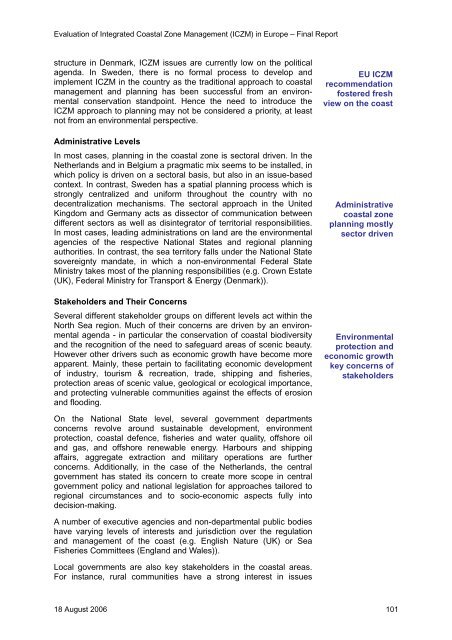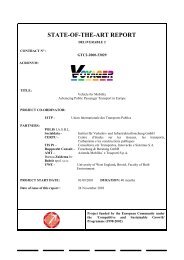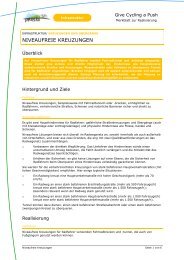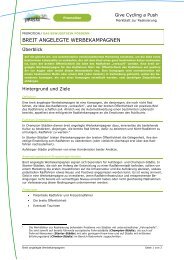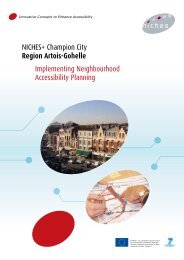Evaluation of Integrated Coastal Zone Management (ICZM) in ...
Evaluation of Integrated Coastal Zone Management (ICZM) in ...
Evaluation of Integrated Coastal Zone Management (ICZM) in ...
You also want an ePaper? Increase the reach of your titles
YUMPU automatically turns print PDFs into web optimized ePapers that Google loves.
<strong>Evaluation</strong> <strong>of</strong> <strong>Integrated</strong> <strong>Coastal</strong> <strong>Zone</strong> <strong>Management</strong> (<strong>ICZM</strong>) <strong>in</strong> Europe – F<strong>in</strong>al Report<br />
structure <strong>in</strong> Denmark, <strong>ICZM</strong> issues are currently low on the political<br />
agenda. In Sweden, there is no formal process to develop and<br />
implement <strong>ICZM</strong> <strong>in</strong> the country as the traditional approach to coastal<br />
management and plann<strong>in</strong>g has been successful from an environmental<br />
conservation standpo<strong>in</strong>t. Hence the need to <strong>in</strong>troduce the<br />
<strong>ICZM</strong> approach to plann<strong>in</strong>g may not be considered a priority, at least<br />
not from an environmental perspective.<br />
Adm<strong>in</strong>istrative Levels<br />
In most cases, plann<strong>in</strong>g <strong>in</strong> the coastal zone is sectoral driven. In the<br />
Netherlands and <strong>in</strong> Belgium a pragmatic mix seems to be <strong>in</strong>stalled, <strong>in</strong><br />
which policy is driven on a sectoral basis, but also <strong>in</strong> an issue-based<br />
context. In contrast, Sweden has a spatial plann<strong>in</strong>g process which is<br />
strongly centralized and uniform throughout the country with no<br />
decentralization mechanisms. The sectoral approach <strong>in</strong> the United<br />
K<strong>in</strong>gdom and Germany acts as dissector <strong>of</strong> communication between<br />
different sectors as well as dis<strong>in</strong>tegrator <strong>of</strong> territorial responsibilities.<br />
In most cases, lead<strong>in</strong>g adm<strong>in</strong>istrations on land are the environmental<br />
agencies <strong>of</strong> the respective National States and regional plann<strong>in</strong>g<br />
authorities. In contrast, the sea territory falls under the National State<br />
sovereignty mandate, <strong>in</strong> which a non-environmental Federal State<br />
M<strong>in</strong>istry takes most <strong>of</strong> the plann<strong>in</strong>g responsibilities (e.g. Crown Estate<br />
(UK), Federal M<strong>in</strong>istry for Transport & Energy (Denmark)).<br />
Stakeholders and Their Concerns<br />
Several different stakeholder groups on different levels act with<strong>in</strong> the<br />
North Sea region. Much <strong>of</strong> their concerns are driven by an environmental<br />
agenda - <strong>in</strong> particular the conservation <strong>of</strong> coastal biodiversity<br />
and the recognition <strong>of</strong> the need to safeguard areas <strong>of</strong> scenic beauty.<br />
However other drivers such as economic growth have become more<br />
apparent. Ma<strong>in</strong>ly, these perta<strong>in</strong> to facilitat<strong>in</strong>g economic development<br />
<strong>of</strong> <strong>in</strong>dustry, tourism & recreation, trade, shipp<strong>in</strong>g and fisheries,<br />
protection areas <strong>of</strong> scenic value, geological or ecological importance,<br />
and protect<strong>in</strong>g vulnerable communities aga<strong>in</strong>st the effects <strong>of</strong> erosion<br />
and flood<strong>in</strong>g.<br />
EU <strong>ICZM</strong><br />
recommendation<br />
fostered fresh<br />
view on the coast<br />
Adm<strong>in</strong>istrative<br />
coastal zone<br />
plann<strong>in</strong>g mostly<br />
sector driven<br />
Environmental<br />
protection and<br />
economic growth<br />
key concerns <strong>of</strong><br />
stakeholders<br />
On the National State level, several government departments<br />
concerns revolve around susta<strong>in</strong>able development, environment<br />
protection, coastal defence, fisheries and water quality, <strong>of</strong>fshore oil<br />
and gas, and <strong>of</strong>fshore renewable energy. Harbours and shipp<strong>in</strong>g<br />
affairs, aggregate extraction and military operations are further<br />
concerns. Additionally, <strong>in</strong> the case <strong>of</strong> the Netherlands, the central<br />
government has stated its concern to create more scope <strong>in</strong> central<br />
government policy and national legislation for approaches tailored to<br />
regional circumstances and to socio-economic aspects fully <strong>in</strong>to<br />
decision-mak<strong>in</strong>g.<br />
A number <strong>of</strong> executive agencies and non-departmental public bodies<br />
have vary<strong>in</strong>g levels <strong>of</strong> <strong>in</strong>terests and jurisdiction over the regulation<br />
and management <strong>of</strong> the coast (e.g. English Nature (UK) or Sea<br />
Fisheries Committees (England and Wales)).<br />
Local governments are also key stakeholders <strong>in</strong> the coastal areas.<br />
For <strong>in</strong>stance, rural communities have a strong <strong>in</strong>terest <strong>in</strong> issues<br />
18 August 2006 101


